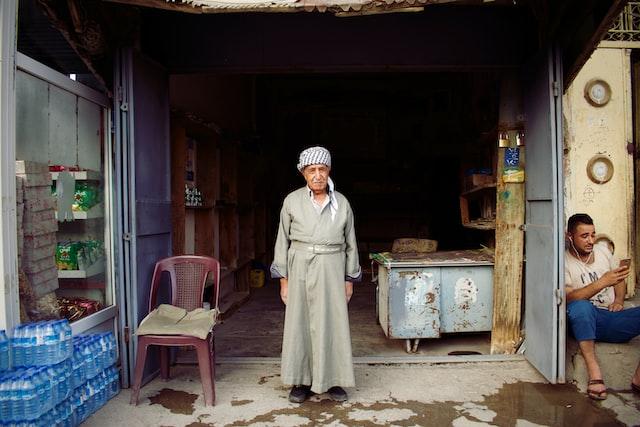Cardinal Louis Raphaël Sako said in the Aug. 1 letter that he would only consider returning to the Iraqi capital if President Abdul Latif Rashid formally recognized him as the leader of the Chaldean Catholic Church and the holder of all its endowments.
Newsdesk (06/08/2023 19:32, Gaudium Press) Sako relocated July 21 to Iraq’s autonomous Kurdistan Region weeks after Rashid revoked a 2013 presidential decree acknowledging that the cardinal is the head of the roughly 630,000-strong Eastern Catholic Church and the figure responsible for overseeing its assets.
“Without this decree, I will remain in Erbil [the capital of Kurdistan Region] until your term ends, and work with the new president to issue an official decree that continues with a tradition that dates back 14 centuries,” Sako told Rashid, whose four-year term ends in October 2026.
In the letter, entitled “A final message to His Excellency the President of the Republic, Dr. Abdul Latif Rashid,” Sako said he had learned that the president was in the process of issuing identity papers to Iraqi Church leaders.
“We are not employees of the state, we are heads of ancient Churches,” wrote the cardinal, who said that he represented 80% of Iraq’s Christians.
Rashid rescinded the 2013 decree amid a war of words between Sako and Rayan al-Kildani, the leader of the Babylon Brigades’ militia and its political wing, the Babylon Movement.
Al-Kildani, who claims to represent the interests of the country’s Chaldean minority, accused Sako of “establishing parties, engaging in electoral battles, and jeopardizing the security and future of Christians in Iraq.”
The cardinal, in turn, said that al-Kildani was “self-aggrandizing and wants to become a leader.”
In his letter to Rashid, Sako rejected what he described as the lies being spread by al-Kildani and his followers.
He said these included claims that the cardinal had described Baghdad as unsafe, had accused the president of incompetence, and was facing dismissal by the Vatican.
Sako told the president: “I will not cease to defend the truth until it is fulfilled, although you said surprisingly to another visitor: ‘I do not understand why Cardinal Sako protests, while Christ was crucified while he was silent.’ Your Excellency, Jesus spoke harsh words against injustice.”
The cardinal, who has led the Chaldean Catholic Church since 2013, first announced in a July 15 open letter that he would “withdraw” from the Patriarchal Headquarters in Baghdad and settle in a monastery in the Kurdistan Region.
Sako explained that he was taking the step following a “deliberate and humiliating campaign” against him by the Babylon Brigades.
The cardinal described the decree’s revocation — which reportedly came days after the president met with al-Kildani — as “unprecedented in Iraqi history.”
Sako suggested that his decision to leave the capital would pave the way for what he called the completion of the “game” played by al-Kildani to seize control of the Church’s assets and install his relatives in management positions.
The U.S. Treasury Department announced in 2019 that it was imposing sanctions on al-Kildani, accusing him of involvement in human rights abuses, including allegedly cutting off a handcuffed detainee’s ear in 2018.
Rashid defended his decision to rescind the decree concerning Sako at a July 17 meeting with Fr. Charles Lawanga Sona, the chargé d’affaires at the apostolic nunciature to Iraq.
“The president reviewed the reasons for withdrawing Republican Decree No. (147) of 2013, as he affirmed that withdrawing the republican decree would not prejudice the religious or legal status of Cardinal Louis Sako, as he was appointed by the Apostolic See as Patriarch of the Chaldean Church in Iraq and the world,” reported the Iraqi News Agency.
Rashid said: “The withdrawal of the decree came to correct a constitutional situation, as the aforementioned decree was issued without a constitutional or legal basis, in addition to the request of heads of churches and other sects to issue similar republican decrees.”
He added: “Patriarch Louis Sako is respected and appreciated by the Presidency of the Republic as the patriarch of the Chaldean Church in Iraq and the world.”
Since his relocation to Erbil, Sako has received messages of support from Church leaders and groups around the world, which have been published on the Chaldean Patriarchate’s website.
The Vatican has not commented publicly on the situation but may be working behind the scenes to resolve the impasse.
Sako has said repeatedly that he would tender his resignation as head of the Chaldean Catholic Church upon reaching the age of 75. According to his official Vatican biography, he was born in 1948.
But in an interview published on July 20 by the German Church’s official news website, Sako clarified: “I was born in 1949. But I had an older brother of the same name who died. My parents gave me his birth certificate. So I won’t be 75 until next year on July 4.”
While the Chaldean Catholic Church is believed to be the largest Christian community in Iraq, other notable Christian communities include the Assyrian Church of the East and the Syriac Orthodox Church.
Both Mar Awa III, the Catholicos-Patriarch of the Assyrian Church of the East, and Patriarch Ignatius Aphrem II, the head of the Syriac Orthodox Church, have expressed solidarity with Sako.
The number of Iraqi Christians is believed to have fallen from 1.5 million before the 2003 U.S.-led invasion to perhaps as low as 150,000.
The advocacy group Open Doors ranked Iraq as the 18th-worst place in the world in which to be a Christian in its 2023 World Watch List.
It said that all of the country’s diverse Christian communities “are seriously affected by intolerance, discrimination, and persecution from local leaders, government authorities, and Islamic extremist groups.”
Francis became the first pope to visit Iraq in March 2021.
- Raju Hasmukh with files from The Pillar



































